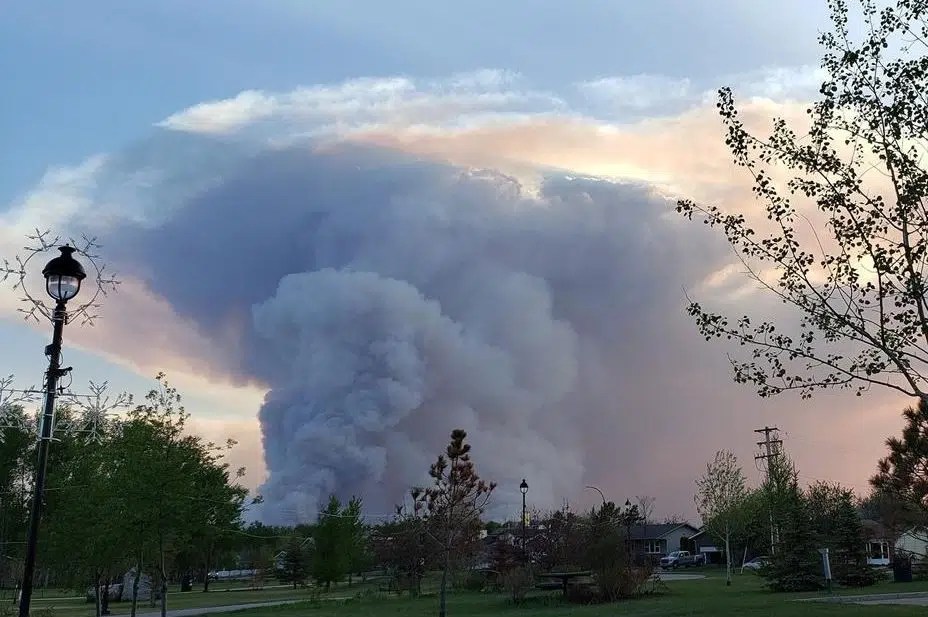A wildfire prompted an evacuation alert on Thursday for a northern Alberta town that was partially destroyed in a 2011 blaze.
Slave Lake Mayor Tyler Warman said the fire was not an immediate threat and people weren’t being forced out like they were more than a week ago in High Level, 485 kilometres to the north.
He said the flames were still about 30 kilometres away from Slave Lake as of midday, but officials wanted residents to be prepared to leave.
“We’ve got a fire, that started around the same time as the High Level one, that’s been north of town for a while,” Warman said. “The wind conditions and the extreme dryness have pushed some of it closer to town.”
Slave Lake was the latest community to be put on evacuation alert, as several fires raged out-of-control in northern Alberta and blanketed areas to the south in an acrid haze.
Many of the 5,000 people forced out of the High Level area on the Victoria Day long weekend are being housed in Slave Lake.
An evacuation order was issued Thursday afternoon for the hamlet of Marten Beach, about 20 kilometres north of Slave Lake, due to the fire.
“The MD has declared a local state of emergency because of that, but we’re not panicked at this point,” said Warman, who was a town councillor and firefighter during the 2011 wildfire that raced through part of Slave Lake.
He said the fires are bringing back memories.
“We are more prepared than we have ever been. We’re more cautious than we have been in the past.”
Earlier in the day, residents of Chipewyan Lake Village, about 450 kilometres north of Edmonton, were also ordered to leave because of a fire that threatened to cut off access to the area.
And different fires forced evacuations from the hamlet of Wabasca, the Bigstone Cree Nation and Northern Lights County.
The Chuckegg Creek fire raging near High Level won’t stop growing.
“(It) went on a pretty serious run yesterday where it grew 80,000 hectares in about 24 hours and travelled a little more than 22 kilometres between noon yesterday and 4 a.m. this morning,” said Derek Gagnon, a provincial information officer. “The average speed would then be around 23 metres per minute.”
“We had really strong winds out of the north that combined with really dry fuels on the ground.”
The fire covered 2,300 square kilometres Thursday, but crews were still managing to keep the flames out of the town.
High Level Mayor Crystal McAteer, Reeve Josh Knelsen of Mackenzie County and Dene Tha’ First Nation Chief James Ahnassay issued a joint statement late Wednesday on Facebook.
“We know that many of you are very anxious to hear about what is happening with the wildfire and the situation in our communities. Many of you have been out of your homes and away from your work for a long time.” they wrote.
The leaders urged patience.
“We simply don’t know for sure what this fire will do next.
“The danger to High Level remains, and the danger to communities in Mackenzie County and the Dene Tha’ First Nation has increased. Four more areas were evacuated … More than 600 of our neighbours had to leave their homes.”
One of the areas that was evacuated Wednesday was the Paddle Prairie Metis Settlement. There were reports that some homes were damaged, but provincial officials said they were still trying to confirm that.
The goal is to get residents of High Level home by the weekend, said the joint statement.
“But with this wildfire we can’t promise anything … The situation is constantly changing and there are no firm timelines.”
Gagnon said extreme fire conditions will continue until there’s a good rain in the area.
“We’re hoping that we’re going to get at least cooler conditions into next week, particularly around High Level, which will help with the overall hazard,” he said. “But it’s still very dry and any sort of wind will make it very extreme danger.”
People in Edmonton awoke Thursday to a thick, smoky haze that turned otherwise blue skies an eerie grey-orange.
Environment Canada issued a special air-quality statement for the Alberta capital region, warning that people might experience coughing, throat irritation, headaches or shortness of breath.
The Canadian Press







